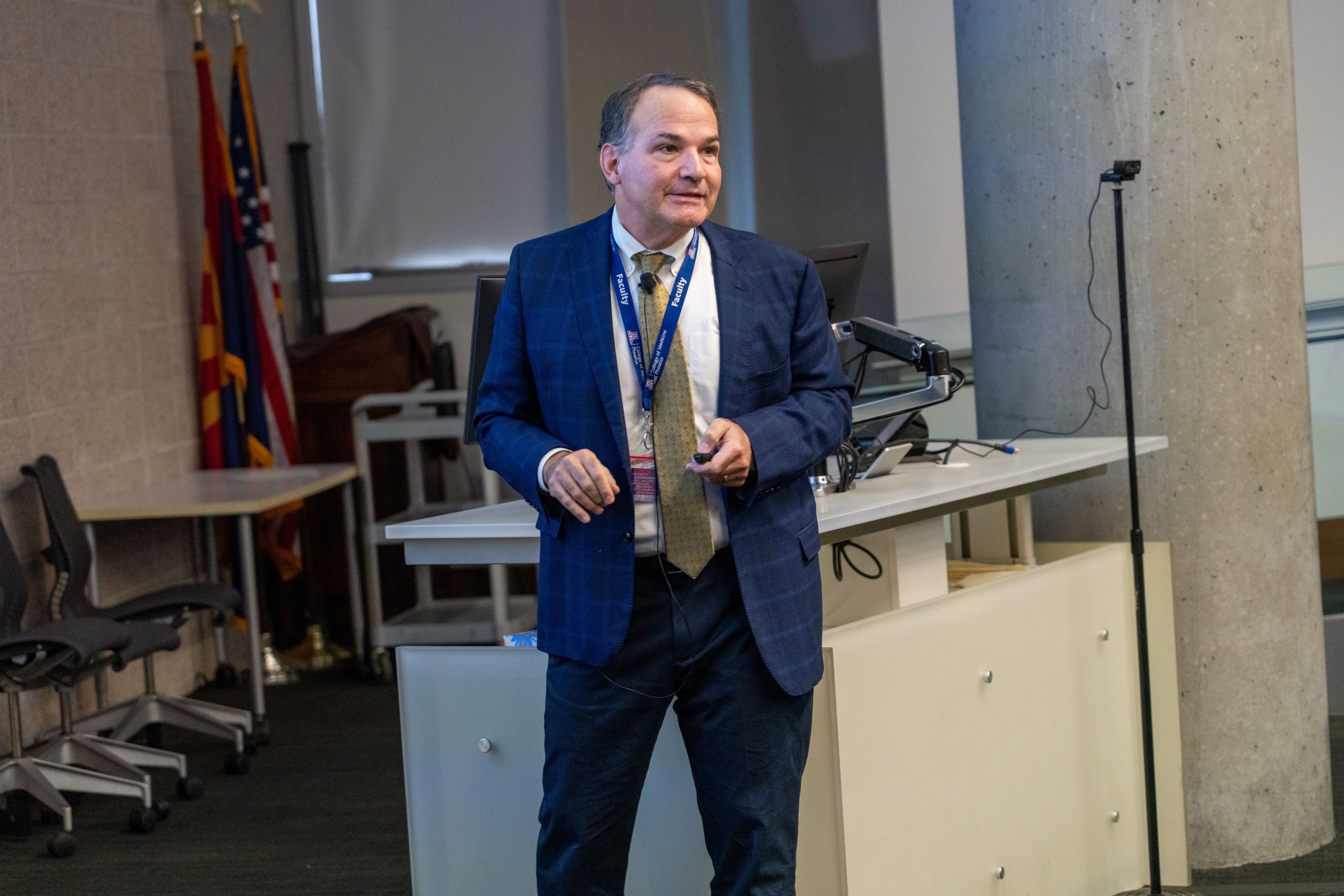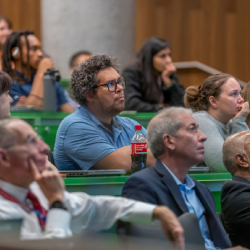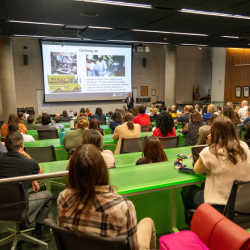
State of the College Emphasizes College’s Contributions to Health Care in Arizona

Dean Fredric Wondisford, MD, MS, MBA, used his State of the College address to highlight the successes of the previous year and showcase what the future holds for the University of Arizona College of Medicine – Phoenix.
Beginning with a brief introduction on his background, Dean Wondisford showed his previous experiences with medical schools and how his experiences guide him.
“I have a composite view of what makes a great medical school,” Dean Wondisford said. “The classic medical school model is going to have to evolve, and the question is who are going to the be the people that are going to evolve medical schools. I believe it’s going to be us.”
Dean Wondisford chose a career in academic medicine because he believes that the interrelated core missions of a medical school uniquely help people. He restated his vision outline from October 2023, which was based on the six R’s (relationships, reorganize, recruit, reach, reinforce and resolve).
In 2007, the University of Arizona College of Medicine – Phoenix had a class of 24 students matriculating into medical school. Between 2020-2023, the College of Medicine – Phoenix grew at an annual rate of 7% while AAMC medical schools typically shrank by 2% during the same period, according to publicly available data. The number of students per class grew to 130 in 2024.

“We are the first, and still remain, the only public allopathic medical school in Phoenix, which is the fifth largest city in the United States,” Dean Wondisford said. “We are now the largest allopathic medical school in Arizona.”
Dean Wondisford also shared plans for growth in doctoral and residency programs. The college will launch a new Phoenix-based PhD program in Fall 2026 that will be under the direction of Taben Hale, PhD, dean of Graduate Studies.
“We’re going to continue to support those graduate programs,” Dean Wondisford said. “Graduate students populate active research labs and active research labs are used to track graduate students. There’s a natural synergistic interaction that needs to be there.”
By 2030, it is projected that Arizona will require more than 3,600 physicians to adequately meet the health care needs of communities. To help address the need, Banner Health and the U of A College of Medicine – Phoenix will increase the number of residency and fellowship positions by 229 in 19 programs by 2027, growing the number of specialty-trained physicians by more than 60 percent. Four new residency programs opened this year.
Dean Wondisford emphasized the college’s mission to reach the rural and urban underserved communities by improving access to primary care. The college will launch a three-year MD curriculum based on the Longitudinal Integrated Clerkship format. A team led by Katie Brite, MD, developed the program, which has received approval from the Liaison Committee on Medical Education.
Medical students who plan to specialize in primary care will be accepted into the program and train in underserved communities. They will complete their MD training and transition to residency a year earlier.
Over the past year, the college has welcomed 96 new staff members and 11 new postdoctoral and graduate students. Dean Wondisford celebrated the college’s commitment to fostering a culture of inclusive excellence with diverse faculty, staff and students. The Pathway Scholars Program was recognized as a program that helps break barriers so that students have an opportunity to pursue careers in medicine.
“We’re actively increasing the number of students in our Pathway Scholars Program,” Dean Wondisford said.

The Women in Medicine and Sciences (WIMS) group was recognized for its strong representation of female physicians in the college, providing networking opportunities for women at the medical school.
“There are many women at our school that have been involved in WIMS,” Dean Wondisford said. “We want to reduce barriers to any group that enter medicine and make sure that men and women are equally represented in our faculty.”
During the talk, Dean Wondisford addressed the Center for Advanced Molecular and Immunologic Therapies (CAMI), which will break ground later in the month. This will focus on developing novel treatments in the Phoenix Bioscience Core (PBC) entrepreneurial environment.
The State of the College address concluded with the announcement that PricewaterhouseCoopers (PwC) has been retained to develop a new five-year strategic plan, which will focus on clinical, research and teaching initiatives that advance all missions and promote agility.
Topics
About the College
Founded in 2007, the University of Arizona College of Medicine – Phoenix inspires and trains exemplary physicians, scientists and leaders to advance its core missions in education, research, clinical care and service to communities across Arizona. The college’s strength lies in our collaborations and partnerships with clinical affiliates, community organizations and industry sponsors. With our primary affiliate, Banner Health, we are recognized as the premier academic medical center in Phoenix. As an anchor institution of the Phoenix Bioscience Core, the college is home to signature research programs in neurosciences, cardiopulmonary diseases, immunology, informatics and metabolism. These focus areas uniquely position us to drive biomedical research and bolster economic development in the region.
As an urban institution with strong roots in rural and tribal health, the college has graduated more than 1,000 physicians and matriculates 130 students each year. Greater than 60% of matriculating students are from Arizona and many continue training at our GME sponsored residency programs, ultimately pursuing local academic and community-based opportunities. While our traditional four-year program continues to thrive, we will launch our recently approved accelerated three-year medical student curriculum with exclusive focus on primary care. This program is designed to further enhance workforce retention needs across Arizona.
The college has embarked on our strategic plan for 2025 to 2030. Learn more.